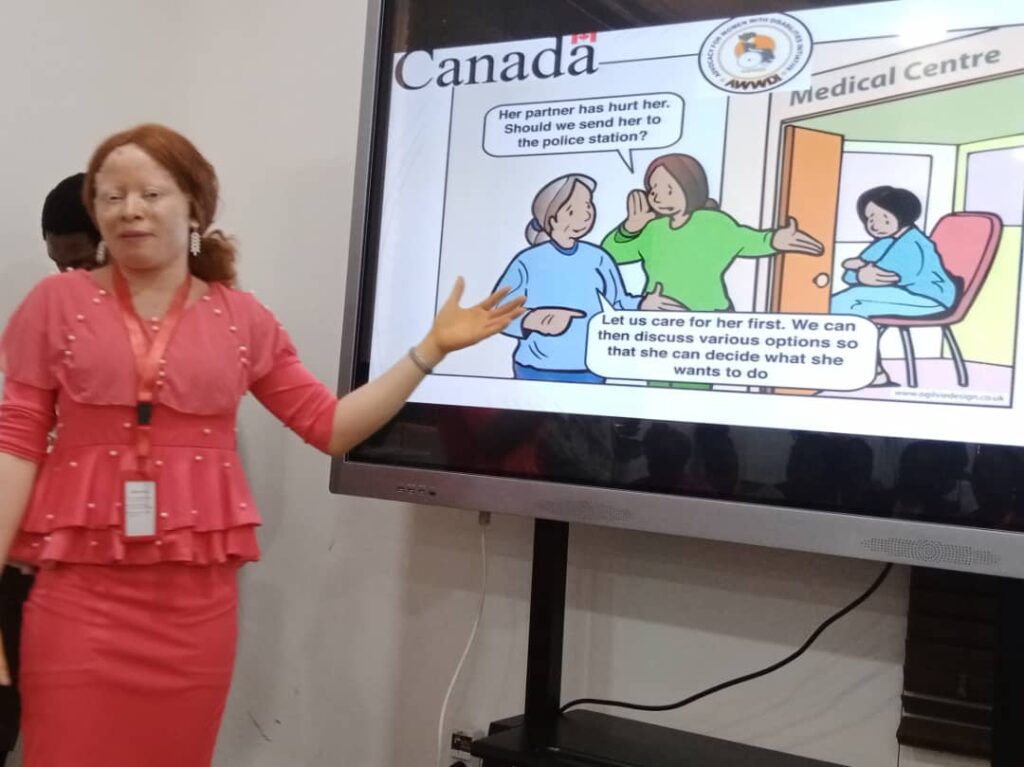Advocacy For Women With Disabilites Initiative (AWWDI) has identified reporting of cases of abuses as the great challenge facing the fight to curb Sexual And Gender Based Violence ( SGBV) against Women and Girl with disabilities (WGWDs).
This was part of the report of the two day training of AWWDI self help group (SHG) leaders in FCT on sexual and gender based violence against women and girls with disabilities Reporting, which took place in Abuja On Wednesday and Thursday 19th and 20th of April 2023.
The event with the theme: Training of self help group leaders in FCT on sexual and gender based violence against women and girls with disabilities Reporting was supported by ActionAid Nigeria and funded by Global Affairs Canada
The training was designed to achieve the following objectives:
- To increase the knowledge of self help group leaders on sexual and gender based violence.
- SHG leaders to identify the channels they can report any case of gender based violence to.
Roseline Migbole, National Public Relation Officer at AWWDI pointed out that reporting of Sexual and Gender-Based Violence (SGBV) allows survivors to access support services to minimize the impact of the violence on their lives. However, research shows that most SGBV survivors do not report.

Speaking further, she stated that Reporting allows survivors of SGBV to access the medical, psychosocial and legal services they need to minimize the impact of the violence on their health and also allows perpetrators to be held accountable. Moreover, formal reporting of SGBV, for example to medical personnel, social welfare officers, legal officers or community leaders, allows accurate estimation of the prevalence of the violence.
She said that it enables proper resource allocation towards interventions to reduce SGBV and provide appropriate care to survivor
She outlined some Barriers to reporting;
The barriers to reporting of SGBV include shame, guilt and stigma associated with, especially, sexual violence; lack of access to medical care; concerns about confidentiality and being believed; and barriers specific to seeking help from police like the fear of reprisal resulting from reporting.
“Similarly, poverty and the costs associated with reporting of SGBV such as transport for the complainant also sometimes hinder reporting and lead to settling cases out of court” she added.
Gender inequality has also been cited as a barrier to reporting of SGBV, especially among female survivors. This is because it renders a lot of women submissive and economically dependent on their male partners who may at times be the perpetrators of the violence.
Gender-Based Violence (GBV) is any form of violence between men/boys and women/girls, in which the female is usually the victim, as a result of an unequal power relationship with the man. It can be physical, emotional, psychological, or sexual in nature, and can take the form of a denial of resources or access to services. It inflicts harm on women, girls, men and boys. SGBV is a violation of human rights. It denies the human dignity of the individual and hurts human development. SGBV is largely rooted in individual attitudes that condone violence within the family, the community and the State.


